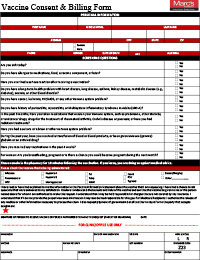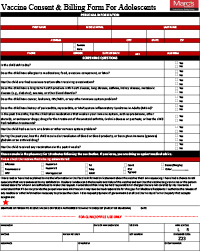Want to save time when getting an immunization?
After you schedule your appointment, print and fill out the below
Consent and Billing Form and bring it to the pharmacy to get your vaccination. This form applies to all of the vaccines that Marc’s has to offer. Read below to see which vaccines are right for you and schedule an appointment today!
Consent and Billing Form for Adults Consent and Billing Form for Adolescents


Currently we offer the following vaccinations.
Immunization Online Scheduler
Influenza (Flu) Vaccine 13 years and older (Inactivated or Recombinant)
Influenza, more commonly known as the flu, is a highly contagious respiratory illness which is caused by the influenza virus. The virus spreads from person to person through respiratory secretions and usually enters the body through mucus membranes in the mouth, nose, or eyes. Although the flu can be contracted at any time during the year, it appears more frequent in the winter and spring. The flu can cause mild to severe illness and could lead to hospitalization and even death. We offer Quad for all patients or High Dose for elderly customers.
To combat the Influenza virus,
it is recommended that everyone is vaccinated, especially those that are at high risk.
High risk individuals include:
- Young children
- Older adults
- those with a profession which increases their exposure
Marc’s offers the influenza vaccination at all locations with a pharmacy and for your convenience you can schedule an appointment online at any one of our 37 Ohio locations. Marc’s Pharmacy strives to offer the lowest price and has the ability to bill most private insurance plans and Medicare. If you have any questions, please do not hesitate to call one of our friendly pharmacists.
Schedule Here
Meningitis Vaccine
Meningococcal disease is a serious illness caused by a type of bacteria called
Neisseria meningitides. It can lead to meningitis (infection of the lining of the brain and spinal cord) and infections of the blood.
Meningococcal disease often occurs without warning – even among people who are otherwise healthy. Meningococcal disease can spread from person to person through close contact (coughing or kissing) or lengthy contact, especially among people living in the same household. Anyone can get meningococcal disease but certain people are at increased risk, including:
- Infants younger than one year old
- Adolescents and young adults 16 through 23 years old
- People with certain medical conditions that affect the immune system
- Microbiologists who routinely work with isolates of N. meningitides
- People at risk because of an outbreak in their community
Schedule Here
Shingles Vaccine
Shingles is a viral infection caused by varicella-zoster, which is the same virus that causes chickenpox. Even after chickenpox is treated, the virus may live on nerve tissues for years before reactivating as shingles. Shingles is characterized by a red rash that causes pain and burning, it is usually limited to one side of the body, typically on the torso, face or neck. While a majority of people who develop shingles are over the age of 60, it is still possible for shingles to occur in younger adults and children. According to researchers, it is unknown what causes the reactivation of the virus, but the factors that do put certain individuals at a higher risk. Those risk factors include:
- Being 50 years of age or older
- Having had chickenpox at some point in time
- Having diseases that weaken the immune system, such as HIV/AIDS or cancer
- Having had chemotherapy or radiation treatment
- Taking drugs that weaken the immune system, such as steroids or medication given after an organ transplant
Most cases of shingles can be diagnosed by a physician by preforming a simple physical examination. When contracted, shingles typically clears up within a few weeks and rarely recurs. All children and adults who have never had chickenpox should receive a chickenpox vaccine. Adults over 60 should be immunized with the shingles vaccine which helps reduce the severity of the symptoms. The shingles or zoster inoculation is covered in part by most private insurance plans and all Medicare Part D plans.
Schedule Here
Measles, Mumps and Rubella (MMR) Vaccine
Measles -The virus causes rash, cough, runny nose, eye irritation and fever. It can lead to ear infection, pneumonia, seizures (jerking and staring), brain damage and death.
Mumps- the virus causes fever, headache, muscle pain, loss of appetite and swollen glands.
It can lead to deafness, meningitis (infection of the brain and spinal cord covering), painful swelling of the testicles or ovaries and in some cases sterility.
Rubella (German measles) -The virus causes rash, arthritis (mostly in women), and mild fever.
If a woman gets rubella while she is pregnant, she could have a miscarriage or her baby could be born with serious birth defects.
These diseases spread from person to person through the air. You can easily catch them by being around someone who is infected.
Who should get the vaccination?
- should get 2 doses of MMR vaccine:
- First Dose: 12-15 months of age
- Second Dose: 4-6 years of age (may be given earlier, if at least 28 days after the 1st dose)
- Some infants younger than 12 months should get a dose of MMR if they are traveling out of the country. (This dose will not count toward their routine series.)
- Some adults should also get MMR vaccine: Generally, anyone 18 years of age or older who was born after 1956 should get at least one dose of MMR vaccine, unless they can show that they have either been vaccinated or had all three diseases. MMR vaccine may be given at the same time as other vaccines.
Schedule Here
Pneumonia Vaccine
Pneumonia is an infection in one or both of the lungs. Many germs such as bacteria, viruses, and fungi can cause pneumonia. The infection inflames your lungs’ air sacs, which are called alveoli. The air sacs may fill up with fluid or pus, causing symptoms such as a cough with phlegm, fever, chills, and trouble breathing. Pneumonia and its symptoms can vary from mild to severe. Many factors affect how serious pneumonia is, such as the type of germ causing the infection as well as your age and overall health. Pneumonia tends to be more serious for:
- Infants and young children
- Older adults (people 65 years of age or older)
- People who have preexisting health problems, such as heart failure, diabetes, or COPD (chronic obstructive pulmonary disease)
- People who have weak immune systems as a result of diseases or other factors. Examples include HIV/AIDS, chemotherapy, and individuals who have received an organ, blood, marrow, or stem cell transplant
PCV13 or PREVNAR 13 is recommended for:
- Children and adults 2 to 64 years of age with certain health conditions
- All adults 65 years of age and older
PPSV23 or PNUEMOVAX 23 is recommended for:
- All adults 65 years of age and older,
- Anyone 2 through 64 years of age with certain long-term health problems,
- Anyone 2 through 64 years of age with a weakened immune system,
- Adults 19 through 64 years of age who smoke cigarettes or have asthma.
Most people need only one dose of PPSV23 as well as one dose of the PCV13. A second dose of PPSV23 is recommended for certain high-risk groups. People 65 and older should get a dose even if they have gotten one or more doses of the vaccine before they turned 65.
Schedule Here
Hepatitis B Vaccine
Hepatitis B is a serious disease that affects the liver. It is caused by the hepatitis B virus. Hepatitis B can cause mild illness lasting a few weeks, or it can lead to a serious, lifelong illness. Hepatitis B virus infection can be either acute or chronic. Chronically-infected people can spread hepatitis B virus to others, even if they do not feel or look sick themselves. Up to 1.4 million people in the United States may have chronic hepatitis B infection. About 90% of infants who get hepatitis B become chronically infected and about 1 out of 4 of them dies. Early symptoms may include abdominal pain, dark urine, fever, joint pain, loss of appetite, nausea and vomiting, weakness and fatigue, and jaundice( yellowing of the skin or eyes)
Acute hepatitis B virus infection is a short-term illness that occurs within the first 6 months after someone is exposed to the hepatitis B virus. This can lead to:
- fever, fatigue, loss of appetite, nausea, and/or vomiting
- jaundice (yellow skin or eyes, dark urine, clay-colored bowel movements)
- pain in muscles, joints, and stomach
Chronic hepatitis B virus infection is a long-term illness that occurs when the hepatitis B virus remains in a person's body. Most people who go on to develop chronic hepatitis B do not have symptoms, but it is still very serious and can lead to:
- liver damage (cirrhosis)
- liver cancer
Who should get this vaccination?
- People whose sex partners have hepatitis B
- Sexually active persons who are not in a long-term monogamous relationship
- Persons seeking evaluation or treatment for a sexually transmitted disease
- Men who have sexual contact with other men
- People who share needles, syringes, or other drug-injection equipment
- People who have household contact with someone infected with the hepatitis B virus
- Health care and public safety workers at risk for exposure to blood or body fluids
- Residents and staff of facilities for developmentally disabled persons
- Persons in correctional facilities
- Victims of sexual assault or abuse
- Travelers to regions with increased rates of hepatitis B
- People with chronic liver disease, kidney disease, HIV infection, or diabetes
- Anyone who wants to be protected from hepatitis B
Schedule Here
TDAP Vaccine
TETANUS (Lockjaw) causes painful muscle spasms and stiffness, usually all over the body. It can lead to tightening of muscles in the head and neck so the victim cannot open their mouth, swallow, or sometimes even breathe. Tetanus kills about 1 of 5 people who are infected.
DIPHTHERIA can cause a thick membrane to cover the back of the throat. It can lead to breathing problems, paralysis, heart failure, and even death.
PERTUSSIS (Whooping Cough) causes severe coughing spells which can lead to difficulty breathing, vomiting, and disturbed sleep. It can lead to weight loss, incontinence, rib fractures and passing out from violent coughing. Up to 2 in 100 adolescents and 5 in 100 adults with pertussis are hospitalized or have complications, including pneumonia may result in death.
Tetanus, diphtheria and pertussis can be very serious diseases. These three diseases are all caused by bacteria. Diphtheria and pertussis are spread from person to person. Tetanus enters the body through cuts, scratches, or wounds. The United States saw as many as 200,000 cases a year of diphtheria and pertussis before vaccines were available, and hundreds of cases of tetanus. Since them, tetanus and diphtheria cases have dropped by about 99% and pertussis cases by about 92%.
Who should get this vaccine?
- TDAP is recommended for all adults who have never received the vaccine
- If you have received the TDAP in the past, a Td Booster is recommended every 10 years
Schedule Here